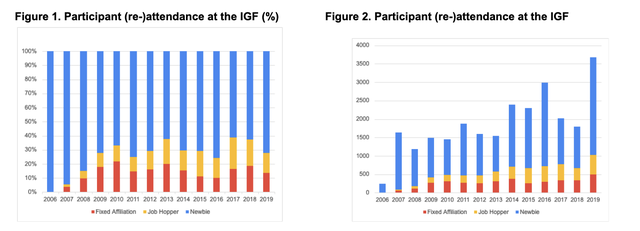Our policy brief covers stakeholder composition of the Internet Governance Forum. We conducted a detailed analysis of stakeholder identification of individuals who attended the Internet Governance Forum on-site from 2006 until 2019. We also reflected on their attendance and re-attendance numbers and mapped that to visualise mobility of returning participants within and across stakeholder groups.
In June 2020, the United Nations Secretary General presented the Roadmap for Digital Cooperation. The Roadmap outlines a set of recommended actions for the Internet ecosystem and the wider international community. In the document, the cooperation of multiple and diverse stakeholders is described as being crucial to the future of our society.
Many related strategic documents maintain a focus on multistakeholderism as bringing together states, the private sector, civil society, and the technical community. In our policy brief we challenge the scope of that definition. We believe that a much more nuanced characterisation of different stakeholder groups is called for in order to properly identify who actually contributes to dialogues taking place at policy making forums such as the Internet Governance Forum (IGF).
To this end, we conducted a detailed analysis of stakeholder identification of individuals who attended the IGF on-site from 2006 until 2019. We closely examined how participants at the IGF identify themselves, their affiliation, and to which stakeholder groups they belong. We also reflected on attendance and re-attendance numbers, mapping that to mobility in returning participation within and across stakeholder groups.
Findings
Some of the policy briefing findings include:
- When different stakeholders participate in the IGF’s, they tend to resort to self-identification and are driven more by a logic of representation rather than participation. In essence, analysis of the IGF’s impact is based on who a participant is, rather than for what purpose a participant is there.
- In total, 18,968 unique individual participants attended an IGF annual event from its inception to the 2019 event. Of these, 10,000 people have attended the IGF only once.
- The manner in which we look at Civil Society changes the manner in which stakeholders are invited to the table, and what our expectations of the resulting dialogue should be.

Recommendations
The brief also sets out a list of recommendations for the IGF secretariat. These are primarily focused on the need for more precise and consistent terminology in IGF statistics and forms in order to support future analysis of these issues. There is also a call for a more considered approach to issues of representation vs participation at the IGF. The blend of representative and participatory models of engagement can make it unclear whether individuals take part in the IGF to represent an organisational position, or to participate as informed individuals. Whilst we understand that this is not an easy issue to address, we think that a reflection on this can be useful to determine the expectations for the IGF going forward.
With UN emphasis on ensuring digital inclusion for all and building a more effective architecture for digital cooperation through a multistakeholder systems approach, it is imperative to understand how stakeholders are identified and how their interests are represented. This is particularly in the context of questions around the composition of, and mobility within, policy making forums such as the Internet Governance Forum (IGF). We hope this report and others like it will help shed light on these issues.
I would like to end by noting that this study is carried out in the framework of the research project Global and Regional Multistakeholder Institutions (GREMLIN) funded by the Vrije Universiteit Brussel (VUB). It is a collaborative project between the VUB, Ghent University, and the United Nations University Institute for Comparative Regional Integration Studies (UNU-CRIS). Its purpose is to assess the effectiveness and legitimacy of multistakeholder processes in the fields of trade and Internet Governance.


Comments 1
The comments section is closed for articles published more than a year ago. If you'd like to inform us of any issues, please contact us.
Chris Buckridge •
Thank you for sharing this, Nadia! It's interesting to consider the limitations imposed by an "inclusion according to stakeholder group" approach (while accepting that it may well be the best approach we've currently come up with!). Multistakeholderism is hard...